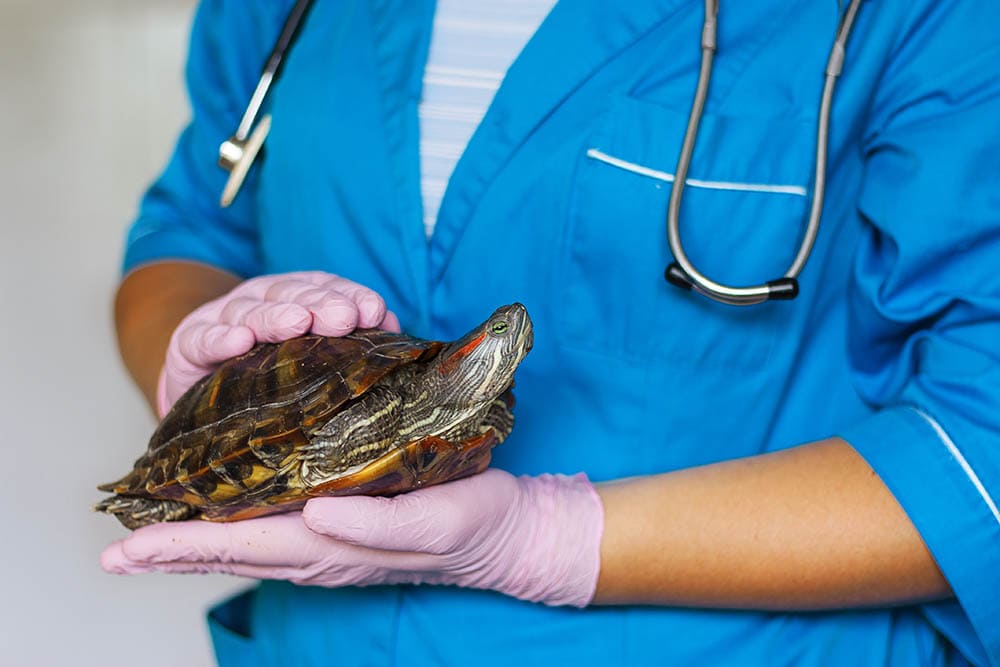
Click to Skip Ahead
Turtles make some of the most adorable and entertaining pets to keep, but before you bring one home, you may wonder if they’ll make your home stink. The good news is that with a proper setup, care, and good hygiene, your pet turtle should not stink.
Though turtles have a distinct smell, just as any other animal or person does, you’ll only sense a foul odor from them, or their tank, if their environment is unclean or if they have specific health issues. Keep reading to learn more!
What Causes Turtles to Stink?
By understanding what makes turtles and turtle enclosures stink, you can take steps to avoid the causes and enjoy keeping an odor-free, happy turtle in your home.

Enclosure Size
Turtles need lots of space. When you first purchase a turtle, they’re likely to be quite small, but they will soon grow, and with bigger turtles comes more waste. A tank that’s too small is likely to rapidly become unhygienic and begin to smell bad.
When purchasing a tank, look to get one that can cater to 10 gallons for every inch of your turtle’s (adult) shell length. For example, the Southern Painted Turtles grow to around 5 inches, so a 55-gallon tank would be suitable for a single turtle.
Remember, the bigger the tank, the better! Your pet turtle won’t complain if they have excess space, but the water quality will deteriorate quickly if they don’t have enough.
Keep in mind that aquatic turtles require an aquarium (an enclosure that is designed to hold water). On the other hand, terrestrial turtles (such as the Eastern box turtle) are very poor swimmers and don’t do well if forced to swim. Likewise, tortoises are exclusively land dwellers and are very weak swimmers. They can be housed in a terrarium.
All pet turtles seem to be at their best if eventually placed in a secure outdoor enclosure with access to plenty of space, a pond (for swimmers), and access to natural sunlight. Though this might be risky for a juvenile, it is considered acceptable for full grown adults that have no natural predators (even still, you need to make sure the enclosure is predator and escape-proof).
Enclosure Cleanliness
A build-up of scraps of food, debris, and feces can quickly lead to a smelly enclosure. You’ll need to use tongs, net, gravel vacuum, siphon, or—more likely—a combination of these tools to remove pieces of uneaten food, feces, and debris (including dead plants and rotting logs) daily when catering to the needs of an aquatic turtle.
Aquatic turtles also require frequent water changes. However, because they naturally harbor Salmonella, a partial water change (such as 25-50%) isn’t recommended for these turtles. Instead, it is best to do a full water change for them, as this reduces the risk of cross-contamination. This should ideally be done once a week, and is considered mandatory for turtles housed indoors. Their tanks should also have a well-maintained filtration system.
Turtles in a pond don’t need their water changed as frequently, however, they do require a pond filtration system. You may find that your turtles enjoy more time basking outside the water, and therefore, you should focus your cleaning efforts on these areas.

For land dwellers, your cleaning priorities should be the same. For tortoises in particular, the hygiene of their feeding spot is very important. Fresh produce offered to your pets may quickly begin to spoil once left outside, so their feeding areas need to be thoroughly cleaned.
Filtration & Air Circulation
Poor filtration is one of the main causes of a smelly turtle tank. Turtles need much stronger tank filters than fish do. As a rule, you should use a filter that has a flow rate that is at least six to eight times your tank’s water capacity per hour.
It is also important to make sure that your pet’s enclosure is in a well-ventilated area, as stagnant air can quickly lead to a foul smelling home.
Health Issues
If there are no issues with your enclosure setup and cleanliness regimen, a particularly foul odor is often a clue that something is wrong with your pet turtle. Many infections involving the turtle’s shell, respiratory system, eyes, and ears are bacterial in nature. A festering infection can produce a very foul odor, which is extremely strong. At other times, a high amount of internal parasites (along their digestive tract) can lead to particularly foul-smelling feces or diarrhea with a very pungent odor.
If you suspect that your pet is ill, it is important to get them veterinary care promptly. Many health issues have been associated with a foul-smelling odor, and the treatment for each condition is different. In these instances, resolving the underlying issue will help curb the odor from your pet.

Do Turtles Need to Be Bathed?
As long as your turtle’s tank is kept clean, your turtle will rarely need a bath. If you notice algae building on your pet’s shell, however, you should not brush them, as this may hasten the rate at which the algae spreads around their body. If you notice algae on their shell, it’s best to take them to your vet so that they can be brushed clean with a safely diluted medicine to help get rid of the algae. Brushing your otherwise healthy pet (without any shell issues) is considered acceptable.
Conclusion
Turtles have their own distinct smell, but they will not stink unless they are kept in an unclean environment. If they’re kept in an adequately sized enclosure with the proper setup and their enclosure is maintained and cleaned regularly, then your turtle won’t stink unless they have an underlying health issue that is causing them to smell somewhat pungent. In such an instance, it is best to seek veterinary care for your pet.
Featured Image Credit: Ivan Smuk, Shutterstock








